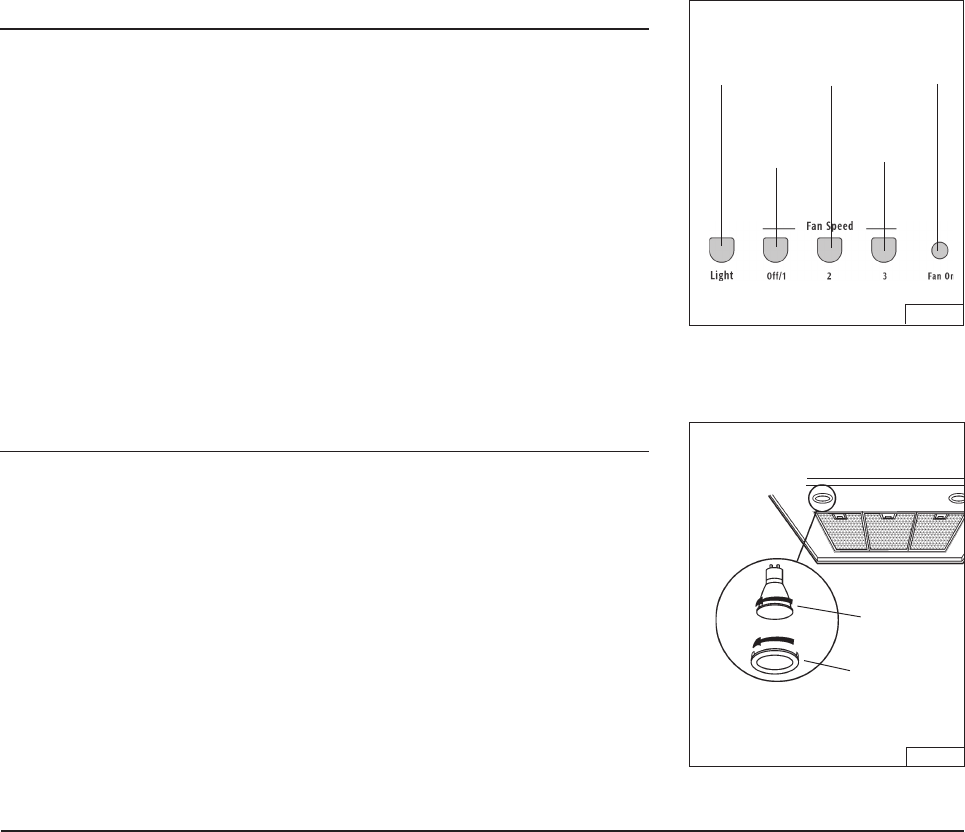
- 3 -
OPERATION
Controls
The hood is operated using the (4) push-buttons located at eye-level, on the front
edge of the hood.
The light switch turns the halogen lamps on and off.
The blower on-low / off switch turns the blower on to its lowest running speed. The
blower must be turned on using this switch. Turn the blower off by pressing this
switch a second time.
The blower medium speed switch changes the blower speed to medium. This
switch works only if the blower is already running at low or high speed.
The blower high speed switch changes the blower speed to high. This switch works
only if the blower is already running at low or medium speed.
The pilot lamp lights up whenever the blower is on.
HALOGEN BULBS
This range hood requires two halogen bulbs (Type GU10, MR16 shielded, 120V,
50W).
ALWAYS SWITCH OFF THE ELECTRICITY SUPPLY BEFORE CARRYING OUT
ANY OPERATIONS ON THE APPLIANCE.
1. Loosen the ring nut by turning it counterclockwise.
2. Loosen the bulb by turning it counterclockwise; pull the bulb downwards to
remove. CAUTION: BULB MAY BE HOT!
3. Replace with Type GU10, MR16 shielded, 120V, 50W halogen bulb.
FIG. 2
LIGHT
SWITCH
BLOWER
ON-LOW /
OFF
SWITCH
PILOT
LAMP
BLOWER
MEDIUM
SPEED
BLOWER
HIGH
SPEED
RING NUT
BULB
MAINTENANCE
Proper maintenance of the Range Hood will assure proper performance of the unit.
Grease Filters
The grease filters should be cleaned frequently. Use a warm detergent solution. Grease filters are dishwasher safe.
See “INSTALL FILTERS” section for removal and installation instructions.
Non-Ducted Recirculation Filters
The non-ducted recirculation filters should be changed every 6 months.
See “INSTALL FILTERS” section for removal and installation instructions.
Hood Cleaning
Stainless steel is one of the easiest materials to keep clean. Occasional care will help preserve its fine appearance.
Cleaning tips:
● Hot water with soap or detergent is all that is usually needed.
● Follow all cleaning by rinsing with clear water. Wipe dry with a clean, soft cloth to avoid water marks.
● For discolorations or deposits that persist, use a non-scratching household cleanser or stainless steel polishing
powder with a little water and a soft cloth.
● For stubborn cases, use a plastic scouring pad or soft bristle brush together with cleanser and water. Rub lightly in
direction of polishing lines or "grain" of the stainless finish. Avoid using too much pressure which may mar the surface.
● DO NOT allow deposits to remain for long periods of time.
● DO NOT use ordinary steel wool or steel brushes. Small bits of steel may adhere to the surface causing rust.
● DO NOT allow salt solutions, disinfectants, bleaches, or cleaning compounds to remain in contact with stainless steel
for extended periods. Many of these compounds contain chemicals which may be harmful. Rinse with water after
exposure and wipe dry with a clean cloth.
Painted surfaces should be cleaned with warm water and mild detergent only.
FIG. 1












